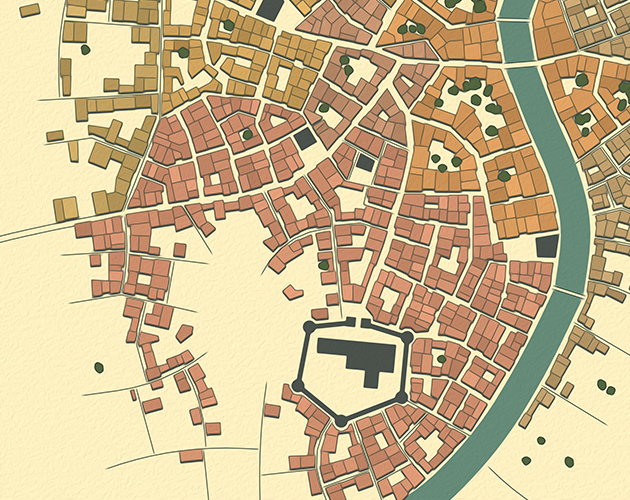Perhaps there's a difference in playstyle here after all. When things finally clicked for me as a DM much better in the civilized portions of the campaign world, was when the line between how we played "in a dungeon" and how we played "in a city" and even "traveling through the wilderness" blurred. What differs is the danger level, but the way we transitioned between routine actions that are unimpeded (hand waved) and time-critical/significant actions (played out), got to be pretty much the same. There was no big shift in mechanic. There was no obvious (to the players) rumor table, since the only way they learned things in a city or a dungeon was by talking to an NPC or monster. Likewise, there never is any grand exposition about the setting, city or otherwise, it all comes out during play, i.e. asking questions of the inhabitants.
Maybe that's why I use the term city/dungeon interchangeably. How different is it when you are in a safe-zone in the dungeon, chatting with the dwarves who control that sieged stronghold...and when you are in the city chatting with a city guard you think might be a spy? For us, not much.
I think I've said this a few times before, but I learned from my experience as player that the world seems far more real when the DM keeps most of the mechanics close to his chest and the players are largely ignorant of how the game-world "moves". As soon as the curtain is pulled back and the probabilities and judgement calls are all laid bare, most of the magic of emergent play dries up. At least that's my experience, although I know many here have very different opinions about that topic....and a great
Fear Of The DM arose in the later edition years.
As to "why should your players care about it?"...there's always just one answer to that question really:
self-interest. There's got to be something they want or need -- or why even be there? If players can't be bothered to plan and scheme to get ahead, then they aren't very good players. It's your job as a DM to (partially) frustrate those desires and keep dandling the carrot out in front of them....AND, as we were just discussing, fill up the world with interesting places/stuff and loaded guns for them (and NPCs) to pick up.
Here's an example: I stuffed a Staff of Power in a cave-complex in the bottom of a lake in a (minor) 3-level dungeon. The only way for the players to get to that underwater-complex was to fall off a bridge into a black lake that they were actively trying NOT to fall off into. I never thought that item would see the light of day, it was just fun for me, as a content-creator, to know it was down there---with it's own little secret history.
Here's the convoluted chain of events that got them to retrieve it:
- the low-level party decides to help a long-time and loyal henchmen find his lost kin and complete a quest (promises of treasure reward)
- traveled through wilderness for months along an old river road having many adventures along the way
- passed through the capital city of a kingdom in decline (elves and wizards outlawed, had to disguise themselves)
- the party's theft had acquired enough experience along the way that he could go up a level, he needed to find someone to train him (no overt thieves guild)
- poked around (covertly) in town until he learned about a retired adventurer (thief) who was now a leather worker.
- the retired thief agreed to train him (at no cost!) if he and the party would ask the Goblin King what became of his wife the previous spring
- the ex-thief guides them through the southern woods to a ruined temple and shows them the hidden dungeon entrance
- they go in, cross the lake, and eventually get "captured" by the goblins and see the King and he/it gives them a different task in exchange for letting them leave
- (LOTS OF OTHER STUFF HAPPENS OVER THE NEXT 2-3 YEARS)
- they have finally found the henchmen's kin in the mega-dungeon and realize that they need something they saw the Goblin King wearing
- they go back to the city and back to the dungeon below the ruins, kill the "immortal" Goblin King (with a weapon they found on their first visit) and take the needed item
- the find an old Earth God shrine behind the throne and make a sacrifice that allows them to have a question answered
- the magic-user had been searching for a staff for a long time now, and asks where the nearest one is---I answer truthfully "At the bottom of the Lake"
- the magic-user is now high enough level to polymorph the party into mermen/mermaids (but her spellbook is back in the city)
- lots of logistics to cart merpeople a day's travel over land from the city back to the dungeon---they only have 3 days before word gets out about the Goblin King's death and the various goblin clans converge to fill the power-vacuum, but they eventually start exploring the submerged level containing the staff. All the while they are hunted by the creature that controls the lake and it's minions.
- They eventually retrieve the staff...which is, of course, majorly cursed.

Point being, that there were many years (4,5?) between the time I placed that item (on a whim!) and when it came in to play. There is absolute zero "concept economy" (as I understand it) involved. Quite the opposite. Isn't that a Courtney Campbell or Alexandrian thing? I've come to realize over time that the way I like to do things has little in common with those paradigms---which it probably why I play a different edition than them. They sound good in a blog, but I don't actually think there's much to them. D&D is not story
writing (I understand no one here is saying it is)...that's just a ditch the hobby fell into and is slowly extracting itself from, as folks wake up to the fact that much was lost from the way the original game was played.
The whole Quantum Ogre concept too---it just never came up. Just not a thing in classic play. The world is just there to explore. There's no "DM intent".
Nada. That's a corruption that started with the Hickman's storytelling BS (combined with lazy DM prep---i.e. no contingencies).
Also worth noting: city-play, wilderness-play and dungeon-play...all seamlessly identical in feel to the players. (i.e. we don't suddenly drop into "hex mode", or "city mode").
Again, this isn't directed at anyone in particular. It's just that I vacillate between thinking
everyone-knows-this-play-style and
no-one-plays-like-this-anymore. I can't decide which is actually the case, but it's when I start to suspect the latter that I tend to blather on like this.
Heh. Long post. It's been awhile.





